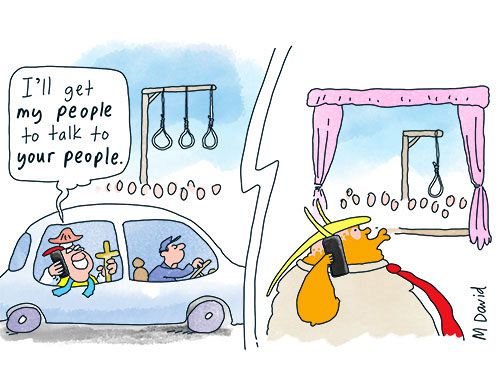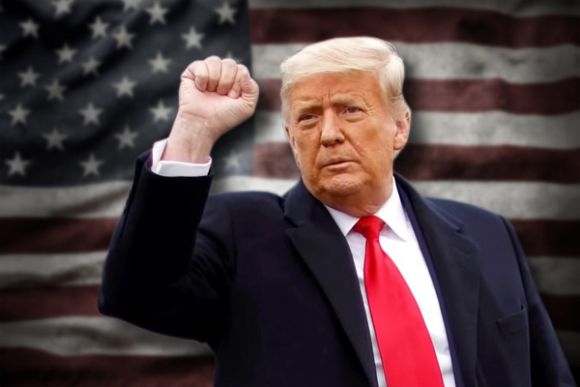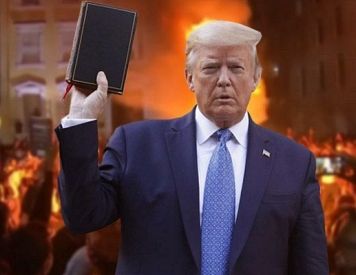Whether misguided Trump supporters, Salman Rushdie, or the 'belligerati', we must be willing to exchange strong words — but words alone – for true freedom of speech, writes Dr Alex Vickery-Howe.
A story
They’re stupid.
I mean it.
They’re excruciatingly stupid.
At the time of writing, Donald J Trump has yet to be charged, but his creepy summer home has been raided and the warrant – which, for some reason, his cult wanted the whole world to know about – lists three statutes that should bury his comeback presidency.
I say should because once words like "espionage" are credibly associated with a presidential candidate, that, logically, should be the end of the line. Then again, the word "insurrection" should have been the final bite of the toxic mango.
I’ve already sounded off about 6 January and the war that never was, but the fact that very few of his supporters – even those purported to be sane – didn’t make that whole noose-waving, shit-smearing, cop-bashing self-own of a coup the very, very last/end of story/no comebacks/I’m taking my bat and ball stand against fascism and nepotism (and straight up cartoonish super-villainy) is beyond disappointing and several exits north of disturbing.
Rewind further: once the idiotic phrases “disinfectant under the skin” and [COVID] "goes away in April", dribbled from Trump’s drug-addled cerebral cortex to his mendacious lips, that should have been lights out.
Rewind further still: "collusion" is not something any self-proclaimed “American patriot” should want anywhere near his or her representative.
Rewind all the way back to season two: can you imagine in your darkest nightmares the phrases "raw dogging", "pee tape" and "pussy grabber" being associated with Ronald Reagan or Jimmy Carter? Apologies for the imagery, but again, once those phrases were credibly – credibly – linked to the "conservative" candidate, that should absolutely, 100 per cent have been the end of the show.
But it drags on...
Reign of Trumps has outlasted House of Cards, which now feels charming by comparison and left many yearning for the relative steadiness of the Selina Meyer presidency. Even the Kardashians were unable to keep up.
Why? Because Trump has phrases of his own: "witch-hunt", "hoax" and "fake news". The faithful keep licking at that Kool-Aid and will probably do so until common sense, karma or COVID catches up to them. If you rewind to the prologue, you see the true, damning extent of this stupidity epidemic — the Trump University scandal. Not enough people talk about this. Not nearly enough.
A scandal
Picture, if you will, Barack "Hussein" Obama –Trumpkins love to slip in names that they think will scare voters – opening a "university" to teach his fans some "quality" real estate skills. I say "university" the same way I say "sandwich artist" to describe my local Subway.
Picture the sheep lining up to be fleeced, raising the limits on their credit cards, offering their life savings and stopping only slightly short of bleeding for their false idol. If Obama had attempted anything so brazen, so blatantly avaricious, shonky to the point of absurdity, he never would’ve touched a toe in the Oval Office. It would’ve been a laughable proposition.
Yet, Trump got away with it. He was sued, he was exposed and he forked out $25 million in damages, but was his reputation in any way impacted? Did it slow his ascension to commander-in-chief or disqualify him in the eyes of his party? Nup. People didn’t care.
Just as they didn’t care when he refused to show his taxes; they didn’t care when he claimed Sweden was dangerous; they didn’t care when he failed to condemn a neo-Nazi murderer; they didn’t care when he mocked the disabled; they didn’t care when he caged children; they didn’t care when he fell in love with an insane dictator – or, maybe, two of them – and they didn’t care when his children had to attend special classes to learn how not to defraud a children’s charity.
Those classes must be tough.
So, yeah, anyone still defending the galaxy’s most obvious conman in late 2022 is a complete and utter booby/dupe/fool/imbecile/dunderhead — in short, the Make America Great Again (MAGA) movement will go down in history as the slowest, thickest, most easily led fascist force of all time. The shit shirts. The tinfoil guard. The ku klutz klan.
Trump’s university grift was merely a microcosm of all the lies and cruelties that followed. This latest raid is unlikely to wake many people up if the university wasn’t already a strong clue that, maybe, maaaaaybe, if you take a step back, he might not be draining the swamp after all but pissing in it. Or perhaps paying prostitutes to piss in it with him.
If you follow a guy who has already been sued for fleecing people like you, I don’t think there’s any saving you from the slaughterhouse — I say this as a vegetarian.
Still, rewinding to that scandal has made me think about universities themselves – the real ones, I mean – and whether, despite my many rants on just how stupid these dupes are, I believe they have a right to be stupid.
And I think they do. I’m willing to fight for their freedom to express their idiocy, their woefully misplaced smugness, their embarrassing climate change denial, their fear, their spite, their sore egos, their petty meanness, their cognitive dissonance, their base dishonesty, their sloganeering and even their repetitive, nonsensical, transcendentally obnoxious memes.
I hate these traits. I loathe them openly. I will keep on ranting in the fading hope that it will make a dent in all that hatred. I will insult Trump and his imitators at home and abroad. However, stupid people do have a right to be stupid, just as I – we – have a right to call them out.
A storyteller
Salman Rushdie is in hospital.
In a month of major news events, from the aforementioned raid at Mar-a-Lago to the tragic death of American actress Anne Heche, the headline that has been nudged down the Twitter feed is the one that perhaps carries the deepest and most troubling implications.
Rushdie is a storyteller. Nothing more, nothing less. He’s a middling celebrity compared to a seditious president but a much more interesting man. Trump surely knows far less about religion than Rushdie does, though, to be fair, they’re probably about equal when it comes to the actual having of faith — which is to say neither have any real belief in the supernatural.
Trump has perhaps never even read a holy book, but he knows they make very useful props and – artfully wielded – the most devastating weapons. Rushdie knows that too.
It was in 1988 that Rushdie wrote The Satanic Verses and only the following year a fatwa calling for his death was issued by the then-Ayatollah of Iran. The rest is literati watercooler conversation, publisher wet dream and popular folklore — or, at least that’s how it felt until his Japanese translator, Hitoshi Igarashi, was murdered in 1991. The killer has yet to be found.
This week, an unhinged zealot jumped onto the stage and repeatedly stabbed Rushdie during a lecture on free expression. Rushdie’s crime was writing a book. Hardly sharing state secrets. Many would like to paint The Satanic Verses as "incendiary" or "blasphemous" and – quite disgustingly – some even pander to the idea that it’s acceptable to blame the victim for bringing it on himself. Let’s call it what it is: a hate crime over a piece of highbrow fantasy fiction.
Biologist and author Richard Dawkins, much like the late great author and journalist Christopher Hitchens, has been a staunch defender of Rushdie’s right to free and unthreatened speech.
A public comment from Dawkins made within 48 hours of the attack was simple and direct:
'Words are not violence. Violence is violence.'
Dawkins echoes writer Evelyn Beatrice Hall in a quote often misattributed to Voltaire:
'I disapprove of what you say, but I will defend to the death your right to say it.'
Rushdie himself said similar words in the wake of the Charlie Hebdo massacre:
'You can dislike Charlie Hebdo… But the fact that you dislike them has nothing to do with their right to speak. The fact that you dislike them certainly doesn’t in any way excuse their murder.'
When this violent assault on Rushdie and the principles he stands for is paired with the ongoing Trump circus in all its now treasonous buffoonery – inevitable given their proximity in the news cycle – a fissure opens up in one’s sense of social justice.
On the one hand, the bigotry, the misogyny and the flirting with fascism that defines the MAGA clowns is a fundamentally intolerable combination to even the most liberal-minded; on the other, if you truly believe in free speech, you must accept that people can believe what they want to believe, say what they want to say, and lie if it soothes their pride.
Dawkins is correct. Words are not violence. Yes, words can be powerful and devastating, and traumatic. They can be hard, they can be unforgivable in certain contexts and irredeemable in others. Words can deny and exclude, belittle and oppress, fuel fires, and shatter emotions. But they are not violence. Stabbing a 75-year-old man in the neck is violence. It’s a distinction both the Right and the Left would do well to remember.
"Belligerati" was the term coined to mock Rushdie, Hitchens and others. In its original context – as a critique of those who broadly supported the Bush invasion of Afghanistan – it was pejorative and not unjustly so — nevertheless, there’s merit in reclaiming and rebooting that word in the wake of such a vicious assault.
A question of debate
I’ve received texts from author, playwright and screenwriter friends who say a line has been crossed. While many of us want to write dangerous stories, we’ve been cautious about doing so. Conformity has been in vogue for far too long. This is a flashpoint.
Returning to the theme of universities, in my capacity as an educator I have started to choose my words carefully. Perhaps a little too carefully. Just as the Right may be criticised for spreading "alternative facts", the Left may fall into the trap of tolerating anything and everything, giving equal floor time to every speaker, conflating fields of study with flights of fancy.
Lecturers were once seen as people who distilled academic scholarship into hourly chunks, sharing research discoveries in a way students could easily digest. If that framework breaks down or ceases to be understood, then it becomes dangerously personal. It’s tricky to establish evidentiary standards and encourage rational debate when an idea can be misinterpreted as a declaration of war.
The attempted murder of Rushdie was a sobering reminder of the grim fate that befell Samuel Paty, the French schoolteacher who was beheaded with a cleaver for a class he gave on (you guessed it) freedom of expression.
So, how do we navigate our heated world with a balance of empathy and authenticity? How do we debate ideas without vilifying the people who share them?
In what should – there’s that word again – should be a secular environment, the social pressure on educators to embrace all points of view, regardless of evidence, can be a very slippery course downhill from scholarship to opinion.
Positioned in this context, the patronising "acceptance" of the far Left may be almost as poisonous as the barefaced propaganda of the far Right. Both are orthodoxies that shut down healthy and honest engagement.
Yet, at the same time, there are old and stale hierarchies embedded in our institutions – including our schools – that do deserve some challenge from emergent philosophy, from a multiplicity of perspectives, including faith-based perspectives, and from the traditional owners on whose lands we teach.
I’d be Trump-level hypocritical if I didn’t embrace that call for progress. It’s not like I was an unquestioning student.
So, how do we navigate our heated world with a balance of empathy and authenticity? How do we debate ideas without vilifying the people who share them?
Rushdie describes nation as a story, family as a story and religion and community as stories.
In his words:
'… a definition of any living society is that you constantly question those stories.'
That, perhaps, is the lesson of August 2022: we’ve lost our way once we’ve lost our confidence to question. This is true of politics. This is true of the academy. This is true of religion. This is certainly true of those who respond to the sharing of ideas with censorship — with the shaming of dissenters and with actual physical violence.
The best ideas surface from rigorous debate, not from uniformity, not from submission — and never, ever from nice compliant silence. If we honour what Rushdie has stood for all these years and what he is currently going through, we must question the stories around us, assert the difference between evidence and belief, and be willing to exchange strong words — but words alone.
I’ll rant and rave at the Trumpkins until my fingers bleed over the keyboard. I’ll throw facts at their lies. I will sink to shameless mockery. At the same time, I’ll defend their right to be who they are.
Oh, but remember…
They’re stupid.
Dr Alex Vickery-Howe is an award-winning playwright and social commentator. He teaches creative writing, screen and drama at Flinders University. You can follow Alex on Twitter @AlexVickeryHowe.
Related Articles
 This work is licensed under a Creative Commons Attribution-NonCommercial-NoDerivs 3.0 Australia License
This work is licensed under a Creative Commons Attribution-NonCommercial-NoDerivs 3.0 Australia License
Support independent journalism Subscribe to IA.















